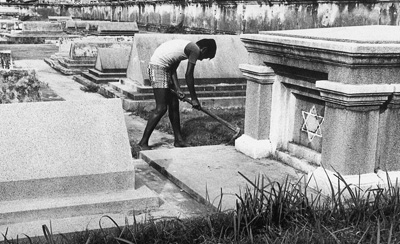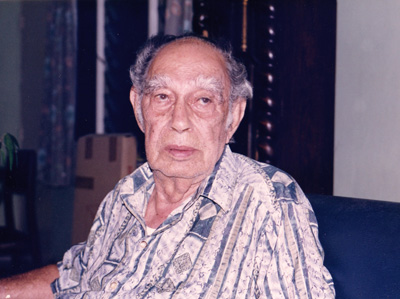Life amid the headstones
A family of Indian laborers has made its home in Penang’s Jewish cemetery for generations
Tibor Krausz
The Jerusalem Report
Penang
When you visit a cemetery, the last thing you expect to find is people living there happily above ground. But this is exactly what I found in the little-known Jewish cemetery of Georgetown on the Malaysian island of Penang.

Hemmed in by the glass-and-concrete monolith of the ruling United Malays National Organization’s spanking new headquarters and a towering Chinese Christian church, it’s the country’s only Jewish graveyard: a lush plot of grass and angsana trees with neat rows of stones on what was once Yehudi Road. It provides home to the family of Selvaraj Sundram, 50, an Indian casual laborer who emerges from his makeshift shack built against the wall, guarding the massive iron-gated entrance.
The then still-vibrant Jewish community hired Sundram’s great-grandfather to look after the plot. The Jews of Penang are long gone, but the first caretaker’s progenies are still cutting grass and scrubbing stone after five generations. Sundram, a dark-skinned Hindu man with a balding pate, was born in the cemetery, got married there, and takes great pride in his “family heritage.”
From a rumpled shopping bag, he produces a crumbling moth-eaten death register dating from 1938 and hands it to me gingerly like a relic. With no new burials since 1978, it now doubles as the guest book, the yellowed ink-blotted pages bearing polite comments by visitors from as far away as the US, New Zealand, France and Argentina. A man from Tiberias in Israel gladly reports that he came looking for his father’s grave and found it here.
Sundram’s four sons have grown up playing hide-and-seek and hopscotch among the headstones that bear the names of Manassehs, Jacobs and Ephraims. The youngest, 10-year-old Vijandrin, a lively little rascal, tells me he enjoys
stargazing while lying supine on the cool flat stones at night.
No ghost has ever bothered him or his family. The only visitations were by representatives of the neighboring UNMO’s offices who wanted to take over the property. They backed down after threats of international hue and cry from the cemetery’s anonymous German donors, who send Sundram his monthly $65 for the upkeep of the place.

It’s not the sum that keeps him there. “We like it here, it’s a quiet place,” he explains, casting a proprietary glance around. “No one bothers us and it’s right downtown.”
His eldest son, 22-year-old Rajel, a bartender in a local hotel who sports a finger-thick gold chain and heavy rings, cites another reason. “If we left, all the drunks and drug addicts would jump the wall and crash on the property,” he offers.
Rajel speaks respectfully of the graves’ inhabitants. Stories about them, he says, pass from one generation in his family to the next. “That big grave over there” —he tells me, pointing to a modern elaborately carved Cadillac of a tomb at the far end of the burial ground — “belongs to a rich playboy who died in a car crash when he was 27 in Singapore in 1972. My uncle told me that he was a handsome man and after he died a new girl came here every week to weep over his grave.”
The nearby Penang Museum tells the history of the island’s Jews. The first Jews settled in Penang in the 11th century, following in the footsteps of pioneering Jewish traders from Cairo. Under the British in the 19th century, they formed a small but thriving community of watchmakers and small businessmen. They left after Malay independence in 1957.
The plot for the cemetery was bought by an English lady, who was the first to be buried there in 1835. The last person likely to take his place in the graveyard is 79-year-old Mordecai David Mordecai, the sole remaining native-born Jew of Malaysia. A tired retiree with aquiline features and bushy eyebrows, he was the manager of a famous local hotel that had served the likes of Rudyard Kipling and Joseph Conrad.
In the cemetery, Mordecai will join his father, a merchant from Baghdad, and his mother, who came from Rangoon. “All the others have left,” he tells me in the modest semidetached home that he shares with his Chinese wife in a leafy suburb of Georgetown. “But I’ll stay here alive and dead.”